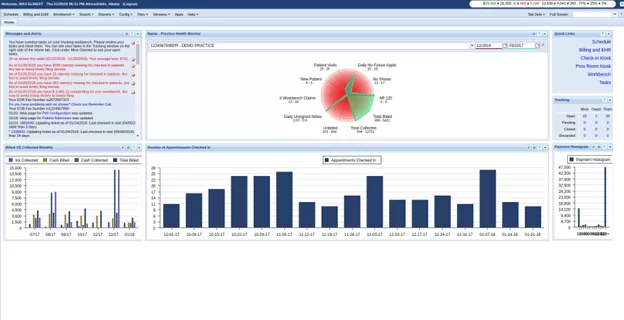Customer Relationship Management (CRM) is a combination of processes, technologies and strategies used by businesses to manage interactions with existing and prospective customers. From eCommerce and real estate to hospitality and financial services, companies across industries implement CRM systems to acquire, nurture, and engage customers, and consequently grow their business.
And healthcare is no exception. In 2021, the healthcare CRM market was estimated at USD 12.7 billion and by 2030, it is expected to reach USD 31.5 billion growing at a CAGR of 10.6%. The focus on patient-centric care and advancements in technology have put healthcare organizations on a chase for implementing CRM solutions in order to enable easy access to data and create personalized offerings.
What is a healthcare CRM
A successful healthcare institution is built on a solid patient-provider relationship. But this relationship can easily be undermined if a patient spends most of a doctor’s visit time filling out forms — 55% of patients admit that their medical history is incomplete or even missing when they come for a visit, according to a survey.
Having a patient’s vital information at the doctor’s fingertips is vital for patient engagement and satisfaction, and CRM helps with that. A healthcare CRM is a domain-specific system that allows healthcare institutions, medical centers, clinicians, and insurance companies to track and manage a patient’s valuable information like:
- Patient forms and notes
- Contact information
- Current and past medications
- Existing and chronic conditions
- History of past appointments
- Billing history, etc.
Source: Elinext
Healthcare CRM: Looking under the hood
Depending on your preferences and business needs, your healthcare CRM can have its own unique set of features. But typically a healthcare CRM solution should come equipped with patient data management, task management, sales and marketing management, and analytics modules that, in their turn, can have their own distinctive features.
Patient data management
Patient data management is the key component of a healthcare CRM system. By consolidating all relevant information about patients under one roof, including personal details, appointment and billing history, a healthcare CRM provides a holistic 360-degree view of patients, helping to speed up patient service.
- Hospital-wide integrations. To gain a truly comprehensive patient view and support consistent patient care, your CRM solution needs to be integrated with electronic health records (EHRs), electronic medical records (EMRs), patient portal and other hospital systems.
- Centralized patient database. With a unified data repository, physicians can ensure that all patient records are up-to-date and easily accessible, which significantly facilitates the communication and improves the accuracy of patient diagnosis.
Task management and collaboration
From patient intake to prescription tracking, a medical CRM streamlines front- and back-office operations to ensure that a healthcare facility functions like a well-oiled machine.
- Appointment management. A CRM can be used to schedule, edit, and manage appointments, including sending automated reminders and notifications to doctors and patients.
- Prescription management. Healthcare practitioners can validate prescriptions by quickly checking them with a patient’s profile and send them electronically.
- Medical billing and invoicing. A healthcare CRM can help with finance management by keeping track of medical billing, managing taxes and personnel wages, procurement and more.
Sales and marketing automation
Healthcare marketing is vital for practices and healthcare institutions that want to promote their brand, expand strategic outreach, and build deeper and more engaged relationships with patients. A healthcare CRM solution can empower a marketing team to launch tailored promotions and nurture leads.
- Newsletters and emailing. A healthcare CRM can automatically organize and customize email campaigns tailored around special promotions and offers.
- Feedback collection. CRM integrated with a patient portal can help healthcare practitioners collect patient feedback to improve the quality of service.
- Referrals management. A healthcare CRM can facilitate patient referrals by enabling secure data exchange regarding a patient’s health and supporting collaboration between different practitioners.
Reporting and analytics
An analytics module aims to provide valuable insights based on the available data collected from a variety of sources to identify the most winning strategies and weak spots in the patient-provider relationships.
- Patient analytics. With vast amounts of personal information readily available in the CRM, marketers can better segment patients according to different criteria like demographics, diagnosis, duration of appointment, etc. This can help create better curated offerings and deliver personalized patient care.
- Physicians’ performance analytics. By tracking and assessing the performance of medical personnel, you can stay on top of their workload and prevent burning out. In addition, you can understand what medical services generate more revenue.
- Custom report generation. A medical CRM needs to provide the ability to create detailed reports according to your needs, i.e. to compare ROI of different campaigns, to track the number of patients by departments, and more.
Major challenges of healthcare CRM software development
In a modern world, a medical CRM solution emerges as a powerful tool that helps hospitals effectively manage and nurture connections with patients. Whether you need a reliable appointment planner to streamline your internal workflows or BI-powered reporting capabilities, you can customize your CRM system to meet your specific demands.
But given the highly complex clinical environment, developing a healthcare CRM comes with its own set of challenges.
1. Strict regulatory compliance
Healthcare is one of the most regulated industries and rightfully so because it has the deepest impact on people’s lives. In the US alone, hospitals and health institutions need to comply with over 600 discrete regulatory requirements. A well-deisgned healthcare CRM system must always be built around the principles of HIPAA and HITECH (US), GDPR (EU), PIPEDA (Canada) and other applicable regulations that may vary from country to country.
2. Patient data protection
In the first half of 2022, the healthcare industry suffered over 330 data breaches with more than 19 million records implicated. Since a healthcare CRM handles sensitive personal data of patients, it can easily become a low-hanging fruit for cyber-criminals should you fail to implement robust security measures. End-to-end data encryption, identity and access management, multi-factor authentication, staff training and other safeguards are a must to protect your healthcare data.
3. Healthcare interoperability
Interoperability in healthcare refers to the ability of different health systems to work together in order to enable free flow of medical information. Healthcare interoperability ensures timely and secure access to health data in order to optimize patient outcomes. Thus, your healthcare CRM must smoothly interact with existing tools, platforms, and systems to improve the quality of service and eliminate duplicate data entry. That’s why it’s essential that the development team has hands-on experience in building powerful CRM APIs and integrating third-party applications.
Do you need a technology partner for your healthcare CRM development project?
Building a custom healthcare CRM has become the need of the hour for many health institutions and practices that are striving to shift to more personalized and patient-centered care. With its rich functionality, a medical CRM can help automate time-consuming workflows, streamline patient management, and personalize care.
Given the complex nature of healthcare software development, it’s crucial to find a reliable tech partner with relevant expertise that can guide you through all the steps of a CRM development project. Elinext is a custom software development company with a strong focus on building modern, high-quality healthcare solutions. Backed by 25 years of experience, Elinext delivers innovative, feature-rich CRM systems that take the burden of administrative tasks off clinicians’ shoulders so that they can focus on what’s important.










